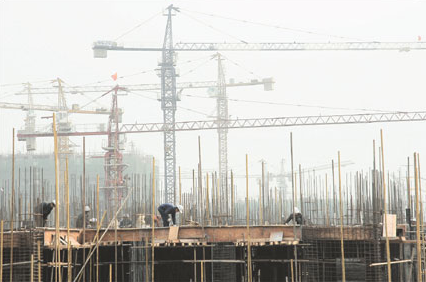Quake-hit villagers rebuild their future with a green blueprint
The devastation in Sichuan Province has given planners the chance to start reconstruction with a clean slate - opting to use solar energy, earthworms to purify water and farmhouses built of bamboo.
|
|
|
Construction workers are busy building eco-friendly structures in quake-hit areas in Sichuan Province. |
In a green valley of Guangyuan city in southwest China's Sichuan Province, people are busily working to rebuild their homes, schools and hospitals, which were devastated during the May 12 earthquake last year.
In Malu Village in the valley, visitors could hardly recognize it used to be a place jolted by the deadly 8.0-magnitude earthquake. School buildings painted in pink and yellow, lines of vegetable greenhouses and new farmhouses stand on the mild slope of mountains.
Together with the rebuilt houses, a new sewage treatment plant has also been under construction. "They are not normal sewage pools, but pools using biotechnologies that purify the water with earthworms," says Professor Yang Jian, designer of the plant, pointing at the two big cement tanks.
Thousands of specially bred earthworms will eat sludge and other wastes in the sewage and the earthworms' feces will become fertilizer, leaving clean water to flow to the nearby river.
This kind of biological sewage treatment pool uses very little electricity compared with the traditional sewage treatment facilities, says Yang, and the whole cleaning process is compatible with the environment.
Before, China only had a small biotech sewage plant for demonstration like this in Shanghai.
Zheng Yonggan, vice director of Zhejiang Huzhou reconstruction assistance team who is in charge of the reconstruction work at Malu Village, says they heard about the sewage program by chance and had invited Professor Yang to help them build the biotech plant in the village.
Walking in the village, visitors could see many energy-saving facilities.
Lines of shining solar panels clad the roofs of school buildings, which allow 1,200 students to take hot showers every day. The wall of the new village hospital is made of insulating materials to keep the house warm in winter and cool in summer, and all roads are lit by solar energy.
Jiang Wei, deputy secretary-general of the Guangyuan Municipal Government, says Malu Village set a good example for an eco-friendly reconstruction in the quake-hit areas. More than a year after the earthquake, the devastated areas are all busy in reconstruction and economic development.
"More construction means we may have more carbon dioxide emissions, yet it also gives us an opportunity to transfer our reconstruction mode to a low-carbon, environmentally friendly and sustainable developing way. Guangyuan is taking this opportunity," Jiang says.
Also as a researcher of sustainable economic development with the Chinese Academy of Social Sciences (CASS), Jiang finds her expertise totally compatible to Guangyuan government's low-carbon development plan.
Luo Qiang, secretary of Communist Party of China Guangyuan Committee, says the city, with a population of 3.1 million, has initiated the concept of "low-carbon reconstruction" and has invited experts from CASS and the European Union to map out detailed plans to build Guangyuan's low-carbon construction, industrial system and to promote local resident's environmental protection awareness.
"Building a low-carbon industrial system first needs energy-saving emission reduction, and the increase of carbon sink," says Jiang. "Based on Guangyuan's natural energy resources, we should promote the use of clean energies such as natural gas, hydro-electricity and methane."
The city's extraordinarily rich natural gas resource has encouraged the local government to take the action of "gasifying Guangyuan."
 0 Comments
0 Comments








Comments